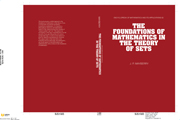1 - The Idea of Foundations for Mathematics
from Part One - Preliminaries
Published online by Cambridge University Press: 05 March 2012
Summary
Why mathematics needs foundations
Mathematics differs from all the other sciences in requiring that its propositions be proved. Certainly no one will deny that proof is the goal of mathematics, even though there may be disagreement over whether, or to what extent, that goal is achieved. But you cannot prove a proposition unless the concepts employed in formulating it are clear and unambiguous, and this means that the concepts used in a proof either must be basic concepts that can be grasped directly and can be seen immediately to be clear and unambiguous, or must be rigorously defined in terms of such basic concepts. Mathematics, therefore, since it is about proof is also about definition.
Now definition and proof are both species of the genus explanation: to define something is to explain what it is; to prove something is to explain why it is true. All scholars and scientists, of course, deal in explanation. But mathematicians are unique in that they intend their explanations to be complete and final: that must be their aim and ideal, even if they fail to realise it in full measure. From these simple observations many consequences flow.
Perhaps the most important of them concerns the mathematician's claims to truth. Because he deals in proof, those claims must be absolute and unqualified. Whether they are justified, either in general, or in particular cases, is, of course, quite another matter: but that they are, in fact, made cannot be denied without stripping the word “proof” of all meaning.
Information
- Type
- Chapter
- Information
- The Foundations of Mathematics in the Theory of Sets , pp. 3 - 16Publisher: Cambridge University PressPrint publication year: 2001
